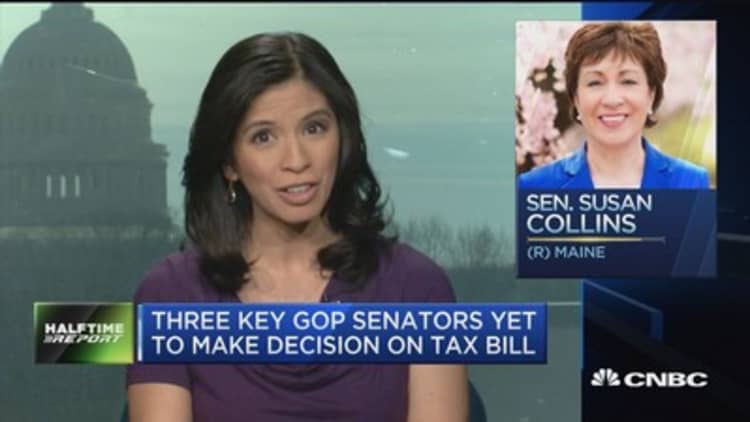Now that the GOP tax bill sharply limits the deduction for state and local taxes, pre-retirees in high-tax states may ponder: Should I stay or should I go?
The final version of the "Tax Cuts and Jobs Act," which was released Friday, places a cap of $10,000 on the deduction filers can take for a combination of state and local income, sales and property taxes. This may be enough to get soon-to-be retirees living in New York, New Jersey and California thinking about relocating to Florida, Alaska and other tax-friendly locales.
"Many people in these high-tax states who are on the cusp of considering retirement will reconsider where they're living – and that changes everything, including your estate planning and retirement planning," said Martin M. Shenkman, a tax and estate planning attorney in Fort Lee, New Jersey.
Before you pack your bags, here are the four key taxes you should know about, and the states with the lowest rates.
Income taxes
Seven states have no individual income taxes: Alaska, Florida, Nevada, South Dakota, Texas, Washington and Wyoming.
Tennessee doesn't tax personal income. However, it does tax capital gains and interest for now. State policymakers last year decided to phase out the "Hall tax" on interest and dividends by 2022. For the 2017 tax year, it's 4 percent.
New Hampshire also doesn't tax wages, but individuals pay a 5 percent levy on interest and dividend income.
Regardless of where you land, take a close look at your state's approach toward retirement income.
"Even when you look at a state with income taxes, retirees need to consider which ones don't tax retirement benefits, including pensions, Social Security and IRA distributions," said Jonathan Mariner, founder and president of TaxDay, a tax-focused app that tracks travel across jurisdictions.
Sales taxes
Five states have no sales tax at the state level: Alaska, Delaware, Montana, New Hampshire and Oregon.
In all, 45 states and the District of Columbia have a sales tax, and 38 states — including Alaska and Montana — have a local sales tax as well, according to the Tax Foundation.
The states with the lowest combined state and local sales taxes are Alaska (1.76 percent), Hawaii (4.35 percent), Wyoming (5.4 percent), Wisconsin (5.42 percent) and Maine (5.5 percent), the Tax Foundation found.
Estate taxes
The GOP tax overhaul doubles the estate tax exemption from $5.49 million per individual to about $11 million. Bear in mind how your state will treat any money you leave behind.
Fourteen states and the District of Columbia have an estate tax: Connecticut, Delaware, Hawaii, Illinois, Maine, Maryland, Massachusetts, Minnesota, New Jersey, New York, Oregon, Rhode Island, Vermont and Washington.
Six have an inheritance tax, which applies to heirs: Iowa, Kentucky, Nebraska, New Jersey, Maryland and Pennsylvania.
"We do see retirees saying that if they have an estate or a family business, that they might move from a state to avoid that tax, as it can be fairly large," said Morgan Scarboro, policy analyst at the Tax Foundation.
Property taxes
Levies you pay on property you own can add to your bill in retirement, especially in places like New Jersey.
In the Garden State, homeowners face a mean effective property tax rate of 2.11 percent, the highest in the country, according to the Tax Foundation.
The five states with the lowest taxes on property are Hawaii (0.28 percent), Alabama (0.40 percent), Louisiana, (0.50 percent), Wyoming (0.51 percent) and West Virginia (0.53 percent), according to data from the Tax Foundation.
Though state and local taxes matter when you're choosing your retirement destination, you should consider a multitude of other things, including the cost of living. Local laws are always in flux, depending on a state's given funding needs, so great deals on taxes now may not last.
"Be prepared for things to change," said Tim Steffen, director of advanced planning at Robert W. Baird & Co. in Milwaukee. "Some attractive states are looking at ways to manage their revenue issues, and wherever you move now, it may not be the same environment in a few years."
WATCH: Three key senators have yet to make decisions on GOP tax bill



